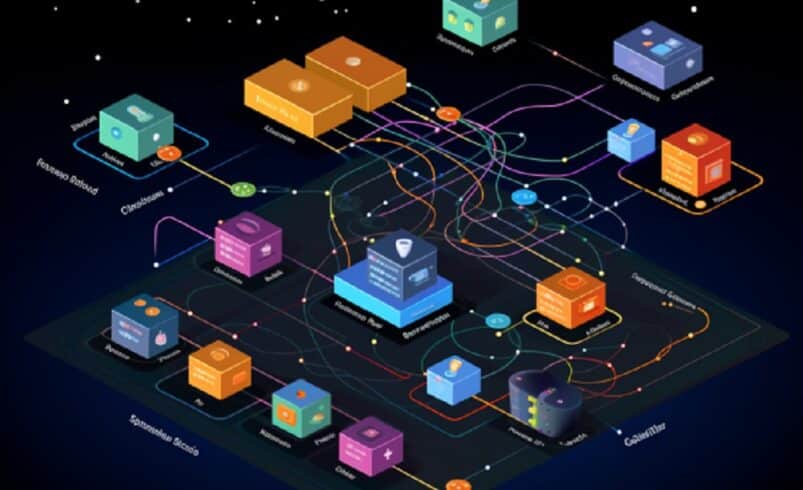6 Leading Decentralized Data Storage Platforms: Here’s What To Know

As the digital world evolves, decentralized storage platforms lead the transformative revolution in managing and distributing information in the Web3 era. Beyond the price gains from BTC and ETH investments, blockchain technology and cryptocurrencies are poised to reshape the digital landscape profoundly.
In an age where data is the lifeblood of our interconnected society, conventional approaches to safeguarding this invaluable resource are under scrutiny. The vulnerabilities of centralized cloud storage, like breaches and cyberattacks, have underscored the dangers of relying on these methods.
This guide offers comprehensive details about the decentralized storage networks.
Understanding Decentralized Storage
Google’s cloud storage solutions have streamlined the process of storing photos, videos, and documents online, granting universal access across connected devices. This model, known as centralized storage, offers convenience but hinges heavily on tech heavyweights like Google and Amazon.
The implications of a security breach or loss at such industry giants could mean that half of the world’s data, applications, and documents would be compromised. In contrast, decentralized storage fragments and disperses data across an extensive network of nodes instead of entrusting data to a single entity or server.
By decentralizing data storage, these platforms mitigate the risks of breaches, hardware failures, and unauthorized access. Additionally, they empower users with complete control over their data, a crucial attribute not available in centralized systems.
Mechanics Of Decentralized Data Storage
There are six pivotal mechanics of decentralized storage.
Fragmentation: When a user opts to store a file on a decentralized network, the system first dissects it into smaller fragments. Thus, no single node possesses the entire file, fortifying security.
Encryption: Each fragment undergoes encryption, an extra layer of protection. Hence, decrypting meaningful information from a malicious actor, even with fragment access, becomes highly challenging.
Distribution: These fragments get dispersed among various storage nodes worldwide after encryption. In node failure or compromise, data retrieval remains possible from other nodes.
Retrieval: When a user requires access to a file, the system locates the fragments, decrypts them, and reconstructs them. This process ensures a seamless user experience akin to traditional storage methods but with heightened security.
Consensus Mechanisms: The consensus mechanisms in blockchain, like Proof-of-Work or Proof-of-Stake, ensure the coherence and trustworthiness of stored data throughout the network.
Incentivization: Decentralized storage platforms incentivize node operators by rewarding these operators with cryptocurrency tokens. This compensation encourages a strong and dynamic network.
6 Leading Decentralized Storage Systems In Crypto
By being built on blockchain’s immutable nature, decentralized storage systems have redefined data storage in our modern world. Here are the top six decentralized storage systems.
IPFS (Interplanetary File System)
Although not a blockchain, IPFS remains one of the most popular decentralized storage systems. With superior scalability and storage capacity, it aspires to revolutionize the internet by replacing traditional HTTP with a peer-to-peer network.
Filecoin (FIL)
Bridging decentralized networks and economic incentives, Filecoin enables users to select storage options based on price and reliability, creating a competitive market.
BitTorrent (BTT)
BitTorrent’s decentralized protocol distributes data globally, reducing reliance on centralized servers. The introduction of the BTT token incentivizes users.
Arweave (AR)
Standing out in the decentralized storage arena, Arweave offers “permanent” data storage. The unique “blockweave” structure ensures data permanence without recurring fees.
Siacoin (SC)
Siacoin’s decentralized cloud storage platform offers user-controlled, cost-effective solutions, Thus advocating privacy, affordability, and decentralization.
Storj (STORJ)
Prioritizing security and privacy, Storj encrypts data before it leaves the user’s device. Tardigrade’s decentralized cloud service blends enterprise-grade durability with decentralized storage benefits.
The Pros And Cons Of Decentralized Storages
With the rising popularity of decentralized storage providers, it’s crucial to consider their benefits and potential drawbacks carefully.
Pros
Enhanced Security: Decentralization diminishes the risk of data breaches, while encryption guarantees that data stays unintelligible even in the event of unauthorized access.
Data Redundancy: Distributing data fragments over numerous nodes ensures data remains accessible, even if a node experiences a failure.
User Control: Decentralized storage returns data ownership to users, ensuring data privacy.
Cost-Effective: Multiple hosts competing in a free market often result in lower storage prices compared to traditional cloud services.
Censorship Resistant: Decentralized storage systems resist censorship by their nature.
Cons
Complexity: The intricacies of blockchain and decentralized systems may be daunting for the average user.
Scalability Concerns: Retrieval speeds in decentralized systems may occasionally lag behind centralized counterparts.
Early Stage: Numerous decentralized storage platforms are still in their early stages, potentially exhibiting bugs and less user-friendly interfaces.
Economic Viability: Storage costs can be affected by the volatility of the crypto market.
Data Loss Risk: Inadequate nodes maintaining a specific piece of data can lead to data loss.
Decentralized storage platforms, though powerful, may pose a steeper learning curve for non-technical persons.
TradeZoneCrypto.com offers high-quality content catering to crypto enthusiasts. We’re dedicated to providing a platform for crypto companies to enhance their brand exposure. Please note that cryptocurrencies and digital tokens are highly volatile. It’s essential to conduct thorough research before making any investment decisions. Some of the posts on this website may be guest posts or paid posts not authored by our team, and their views do not necessarily represent the views of this website. TradeZoneCrypto.com is not responsible for the content, accuracy, quality, advertising, products, or any other content posted on the site.









